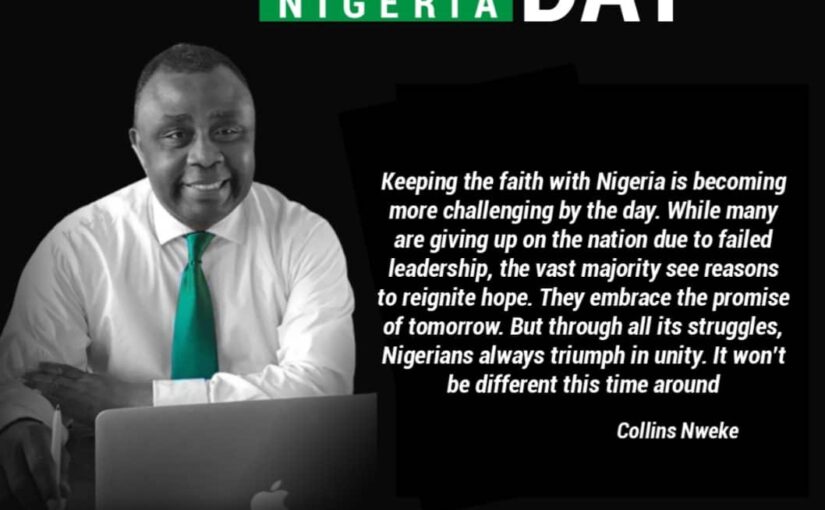There are those who argue that celebrating Nigeria’s Independence is pointless. They hold that a nation so richly blessed yet so poorly led has little to rejoice about. They are not entirely wrong in their lament, but they are wholly mistaken in their conclusion. To celebrate Independence is not to celebrate perfection. It is to affirm perseverance. It is to honour the journey, not the destination. It is to remember that freedom, however flawed, remains the foundation upon which every reform, every protest, every dream of a better Nigeria must stand.
We do not raise our flag because everything is well with our country. We raise it because we refuse to give up on her. For nations, like people, are redeemed not by despair but by determination. Not by walking away from their failures, but by confronting them with faith, courage, and collective resolve. So yes, we celebrate, not to glorify the past, but to summon the future. Not because Nigeria has arrived, but because she is still becoming.
At sixty-five, Nigeria stands as a paradox. A nation old enough to know better, yet young enough to change course. It is a land of immense beauty and brilliance. But it is also one of broken promises and bruised hopes. Born in the euphoria of independence in 1960, Nigeria emerged with grand dreams: of unity in diversity, of prosperity built on purpose, and of greatness rooted in grit. But somewhere between the anthem and the anarchy, between the pledge and the plunder, leadership lost its way.
Our tragedy has never been our people. It has been the poverty of leadership. It has been leaders who mistake office for ownership, who trade vision for vanity, and who preach patriotism while practising pillage. Nigeria’s story has been one of promise repeatedly betrayed by those entrusted with its future. The failures of leadership, not the character of the people, remain the root of the country’s contradictions.
Yet, despite decades of squandered oil wealth, of coups, corruption and recurring crises, Nigerians have never truly surrendered hope. They have suffered, but survived; been mocked, but remained magnificent. From the farmer in the Benue hinterlands who tills the land under an unforgiving sun, to the market woman who trades with dignity in Nkwo Nnewi amid despair; from the young tech innovator coding dreams in Yaba, to the nurse tending lives in London; the Nigerian spirit has endured. Unbreakable, unyielding, unstoppable.
Nigeria’s greatness lies not in her leaders, but in her people. These are a people who build where governments fail; who turn scarcity into creativity and chaos into comedy. They are a people who, despite the darkness, continue to believe in the dawn. Their resilience, ingenuity, and faith are what hold the nation together, long after leadership has faltered.
But hope alone will not save Nigeria. The time has come for deliberate transformation. Nigeria cries for a collective resolve to rebuild the nation its beautiful people deserve. Such transformation must begin with a redefinition of leadership: from privilege to sacred trust. It must extend to a reimagination of governance, from consumption to production, from greed to service. Justice must be restored, for no society can stand on the cracked floor of inequality. Education must be rebuilt, so that our children inherit more than empty promises. And patriotism must be rekindled. Patriotism is not the blind loyalty of slogans, but the fierce love that demands accountability and uplifts the weak.
The time for excuses has passed. The hour for courage has come. Nigeria’s rebirth cannot be left to a single leader or generation. It is not the work of a messiah, but the mission of a people. Together: north and south, home and abroad, rich and poor. We must forge the Nigeria of our dreams and the one our children deserve to inherit.
At sixty-five, Nigeria remains a contradiction, but she is also a conviction. A conviction that greatness delayed is not greatness denied. Though bruised, she is not broken. The same resilience that has carried her through civil war, dictatorship, economic collapse, and despair can still carry her into destiny.
Nigeria is not a lost cause. She is a cause worth fighting for. She is a song worth finishing. Nigeria is an unfinished symphony awaiting the orchestra of her people. As we mark sixty-five years of independence, may we rise not as cynics, but as custodians of hope. Our past may shame us, but our future still summons us.
Happy Independence Day, Nigeria. Your best chapters are still being written by your most extraordinary children.
Stay ahead with the latest updates!
Join The Podium Media on WhatsApp for real-time news alerts, breaking stories, and exclusive content delivered straight to your phone. Don’t miss a headline — subscribe now!
Chat with Us on WhatsApp





